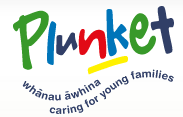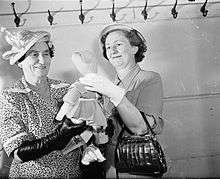Plunket Society
 | |
| Motto | In the first 1000 days we make the difference of a lifetime, Whānau Āwhina |
|---|---|
| Formation | 14 May 1907 |
| Type | Charitable Trust |
| Website | http://www.plunket.org.nz/ |
The Royal New Zealand Plunket Society was an incorporated society in New Zealand until 1 January 2018 when it became the Royal New Zealand Plunket Trust. Plunket provides a range of free health services to children under the age of five with their development, health and wellbeing.[1] The Plunket Society mission is "to ensure that New Zealand children are among the healthiest in the world". A lot of Plunket's work is organised by volunteer bases all around New Zealand.[2] There are many different ways to get involved in the Plunket Society.
The society is most commonly referred to in the community as "Plunket".
From 1 January 2018 Plunket became the Royal New Zealand Plunket Trust under the Charitable Trusts Act 1957.
History

With the motivation to form a 'society' that would 'help mothers and save babies', Dr Frederic Truby King worked on an article focusing on child welfare.[3] A meeting, which led to the founding of the society, was held on 14 May 1907, in Dunedin, by Truby King. King was a medical superintendent and lecturer in mental diseases. He believed that by providing support services to parents, the society could ensure children were fed on a nutritious diet, reducing child mortality rates. He also believed that this would improve adult health as the children got older.
Originally called the Society for the Health of Women and Children, the society gained royal recognition and the prefix Royal in 1915.[4] Plunket's name derives from an early patron of the Society, Victoria Alexandrina Plunket, mother of eight and wife of then Governor of New Zealand, William Plunket, 5th Baron Plunket.[5][6]
Later that year, the society first opened The Karitane Home For Babies in Dunedin, and then opened centres in Auckland, Wellington, and Christchurch. These centres were used for both training camps for the nurses and for the babies that were failing to flourish.[3]
The society laboured for many years under the false perception that it was set up to cater only for European women and their babies; this impression was reinforced by the fact that the Department of Health operated a Native Health Nurse Service specifically for Maori in rural areas.[6]
In 1912, King made a lecture tour on the Plunket Society. In these tours he was highly successful in attracting support for the society, partly because he exaggerated the effect on infant mortality rates.[6] As a result of his tour, 60 new centres opened around New Zealand, each employing a nurse. The centres were badged as Plunket Rooms, however they are now referred to as Plunket Clinics. King published several manuals, among them Feeding and Care of Baby (1913), and The Expectant Mother and Baby's First Months (1916). This latter publication was given to every applicant for a marriage licence.[5]
Mothers were even given practices to inform them of domestic hygiene and mothercraft that were based on King's ideology. They included the regularity of feeding, eating and bowel habits.[3] In New Zealand the Plunket philosophy become 'parenting lore' and within three decades New Zealand had the lowest infant mortality rate in the world.
Plunket today
Many changes have been made to Plunket teaching and organisation over the years. The initial strict parenting regimes have given way to more flexible care and support, and Karitane Hospitals were replaced in the 1970s with Plunket Karitane family centres. 1981 saw the introduction of a car seat rental scheme, and in 1994 a telephone advice service, PlunketLine, was inaugurated. Special training schemes have been initiated for Māori Health Workers to give culturally appropriate guidance where necessary, and Plunket is also seeing an increase in the number of Pacific Island families enrolling.[5]
Today, there are hundreds of centres across New Zealand. The Plunket society is continuing to grow, through the help of technology being able to promote the society.[7] Instead of just having clinics they have centres/services that help with car seats, they also have Facebook chats online so parents/caregivers can ask questions or simply find an answer.
References
- ↑ Plunket. (2016). Plunket.org.nz. Retrieved 15 May 2016, from https://www.plunket.org.nz/
- ↑ Who we are - Plunket. (2016). Plunket.org.nz. Retrieved 15 May 2016, from https://www.plunket.org.nz/what-we-do/who-we-are/
- 1 2 3 Plunket Society formed | NZHistory, New Zealand history online. (1973). Nzhistory.net.nz. Retrieved 16 May 2016, from http://www.nzhistory.net.nz/foundation-of-the-plunket-society
- ↑ Otago Daily Times 1915-06-14, reprinted in '100 Years Ago' column, p.30, 2015-06-15
- 1 2 3 "Who we are". Plunket.org.nz. Retrieved 2015-06-13.
- 1 2 3 Sullivan, Jim (2007) I Was a Plunket Baby: 100 Years of the Royal New Zealand Plunket Society, Auckland: Random House ISBN 9781869418984
- ↑ Plunket near You - Plunket. (2016). Plunket.org.nz. Retrieved 16 May 2016, from https://www.plunket.org.nz/plunket-near-you/?start=900
External links
| Wikimedia Commons has media related to Plunket Society. |
- The Royal New Zealand Plunket Society
- Bibliography on Dr Frederick Truby King
- Developing a Nursing Speciality - Plunket Nursing 1905 - 1920 Thesis by Christine Mary Andrews